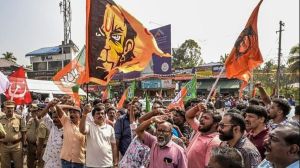Fitna-al-Khawarij: What the term means, and why Pakistan uses it for the militant group TTP
The current clash between Pakistan and Afghanistan is over the TTP, whom Pakistan terms 'Fitna-al-Khawarij' and accuses its neighbour of harbouring. Why is Pakistan using this term as a tool in its fight against the militant group? We explain.
 Smoke goes up after a shell exploded in a border area during clashes between Pakistan and Afghan forces, as seen from Pakistan side of the border near Chaman, Pakistan, Wednesday, Oct. 15, 2025. (AP Photo)
Smoke goes up after a shell exploded in a border area during clashes between Pakistan and Afghan forces, as seen from Pakistan side of the border near Chaman, Pakistan, Wednesday, Oct. 15, 2025. (AP Photo)Pakistani security forces killed around 15 to 20 Afghan Taliban troops on Wednesday (October 15), Inter-Services Public Relations (ISPR), the Pakistan Armed Forces’ media wing, has claimed.
“The situation is still developing. There are reports of further buildup at staging points of Fitna-al-Khwarij and [the] Afghan Taliban,” the statement said.
‘Fitna-al-Khwarij’ is the term the Pakistani State uses for the militant group Tehreek-e-Taliban Pakistan (TTP).
The current wave of violence between Pakistan and Afghanistan is over the TTP, which Pakistan accuses its neighbour of harbouring. Formed in 2007, the TTP has been behind several lethal attacks inside Pakistan.
In August 2024, the Pakistan government released a circular saying that the TTP should henceforth be referred to as Fitna-al-Khawarij. What does this term mean, and why is Pakistan using the name as a tool in its fight against the militant group? We explain.
Meaning of ‘Fitna al-Khawarij’
The etymological approach to understanding the term takes us back to the early political history of Islam. But first, let’s understand its literal meaning.
The term comprises two Arabic words. Fitna refers to chaos or unrest against a ‘righteous ruler’. Khawarij (singular Kharji), also Kharijites, means ‘to leave’ or ‘to get out’. Putting things into context, there are some groups and individuals who refuse to abide by the rules made by consensus. They either choose to leave the larger group or are disowned by the community due to their divergent views.
During the time of Ali ibn Abi Talib, the fourth Caliph, a group of his staunch supporters disagreed with him on the issue of arbitration with Muawiyah ibn Abi Sufiyan. Mu’awiyah was the powerful governor of erstwhile Syria and opposed Ali’s Caliphate due to the unresolved matter of the murder of Ali’s predecessor, Uthman ibn Affan.
Muawiyah accused Ali of failing to deliver justice in the murder case of Uthman. This disagreement led to the Battle of Siffin in 657 AD. The battle remained inconclusive and was ended through arbitration. Hence emerged a group that saw arbitration as a sign of weakness, rather than Ali’s political pragmatism to end the bloodshed among Muslims.
This group came to be known as Khawarij. They wanted Ali to keep fighting and avoid any human compromise against what they considered a matter that should have been decided by divine will.
They seceded from Ali’s camp and continued to vehemently oppose his decision. Their discontent with Ali and their regular attacks on people under his Caliphate led to the battle of Nahrawan (near modern-day Baghdad) in 658 AD.
Ali defeated his former supporters (Khawarij) and offered reconciliation, which was turned down. Ali was eventually assassinated by one of the Khawarij in 661 AD. Ali’s assassin, Abdel Rahman ibn Muljam, attacked him during dawn prayer at the Great Mosque, Kufa, Iraq. Though the Kharajites were suppressed in their initial years, their ideology continues to influence several groups and individuals even today.
Believers versus believers: Ideology of the Khawarij
Kharijites believe in radical religious absolutism. While they find many admirers for their views on egalitarian leadership, they firmly believe that any Muslim who commits a major sin becomes an apostate.
Several militant jihadi groups, including affiliates of Al Qaeda and ISIS, have been branded Khawarij by Islamic scholars. Though the Khawarij consider themselves to be most pious believers, their practices and rigid ideology have found little support from most mainstream clerics across sectarian lines. However, modern Islamic scholars caution against overuse of the label, noting its historical specificity and the risk of mischaracterising diverse movements.
Why is Pakistan using the term for the TTP?
The TTP presents itself as a group involved in a ‘defensive jihad’ against the ‘atrocities’ of the Pakistani Army against Pashtun ethnic groups, especially in Khyber Pakhtunkhwa. They also pledge to ‘liberate Pakistan from US enslavement’. TTP militants over the years have targeted Pakistani security forces, killing many soldiers.
Thus, in a bid to set a counter against the TTP’s appeals of jihad — independence, implementing the Sharia system interpreted on a strict Deobandi understanding of Islam, and resisting socio-economic injustices, the Pakistani Army has chosen to call the militant group, “Fitna al-Khawarij”.
The Pakistani army is fully aware that it needs to garner public support to win any armed conflict in Khyber Pakhtunkhwa. The local population there is not happy with its treatment by the State, and hence supports any ‘tehreek’ (movement) that claims to fight for their rights. Therefore, to counter the TTP’s “saviour” narrative, the army has started terming it a theological deviant. The army hopes that this labelling would be effective in challenging the Islamic legitimacy, if any, of the militant group.
- 01
- 02
- 03
- 04
- 05





































